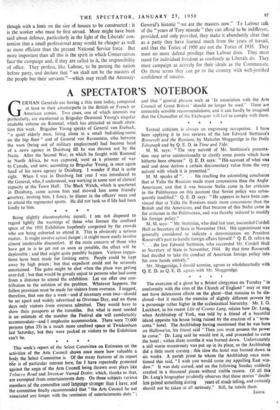Textual criticism is always an engrossing occupation. I have been
applying it to two reviews of the late Edward Stettinius's Roosevelt and the Russians, by Malcolm Muggeridge in the Daily Telegraph and by Q. E. D. in Time and Tide.
M. M. says: "The very naiveté of Mr. Stettinius's presenta- tion may serve unintentionally to clarify some points which have hitherto been obscure." Q. E. D. says: "His account of what was said and done derives a certain documentary value from the very naiveté with which it is presented."
M. M. speaks of " . . . his reaching the astonishing conclusion that at Yalta the Russians made more concessions than the Anglo( Americans, and that it was because Stalin came in for criticism in the Politbureau on this account that Soviet policy was subse- quently modified." Q. E. D. says: "He appears to have been con- vinced that at Yalta the Russians made more concessions than the British and the Americans, and that because of this Stalin came in for criticism in the Politbureau, and was thereby induced to modify his foreign policy."
M. M. says: "'Mr. Stettinius, who died last year, succeeded Cordell
Hull as Secretary of State in November 1944. His appointment was generally considered to indicate a determination on President Roosevelt's part to handle foreign affairs himself." Q. E. D. refers to ". . . the late Edward Stettinius, who succeeded Mr. Cordell Hull as Secretary of State in November, 1944. By that time Roosevelt had decided to take the conduct of American foreign policy into his own hands entirely."
Mr. Muggeridge, I should surmise, agrees as wholeheartedly with Q. E. D. as Q. E. D. agrees with Mr. Muggeridge.










































 Previous page
Previous page